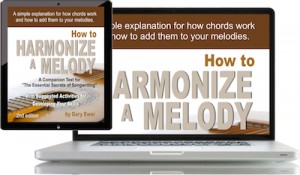Today I say, only half-jokingly, that I had better not hear a songwriter, particularly an American one, tell me that they just can’t think of anything to write about. The subject of the day — Donald Trump’s rise to the presidency — may be difficult to handle, but you sure can’t beat it for providing everything a songwriter needs: a topic, an opinion, and then a rich motherlode of vocabulary to create a lyric.
When it comes to controversy, you’re almost always looking at political or religious issues. Those are the topics that are hard to talk about at the dinner table, and no doubt many an American family had to set some strict “no-politics-at-the-dinner-table” rules for the past several months.
 Chapter 5 of “The Essential Secrets of Songwriting”, 3rd edition, describes how lyrics and melodies usually go hand in hand as powerful partners in the songwriting process. It’s part of the 10-eBook Bundle, and includes a free copy of “Creative Chord Progressions.”
Chapter 5 of “The Essential Secrets of Songwriting”, 3rd edition, describes how lyrics and melodies usually go hand in hand as powerful partners in the songwriting process. It’s part of the 10-eBook Bundle, and includes a free copy of “Creative Chord Progressions.”
Similarly, writing about controversial topics is tricky, especially if you don’t want to alienate up to half of your potential audience. What can you do as a songwriter to make your opinions known without turning away from those who hold a strongly differing view?
Here are three ways to consider dealing with controversy in your song lyrics:
- Embrace the controversy and don’t worry about public reaction. It’s possible to discuss your position in ways that don’t overly rely on rhetoric or hyperbole, but still manage to put your position and attitude on full display. It’s risky, for obvious reasons, and you may push some potential audience away. But most will appreciate the honesty, and understand that everyone has a right to an opinion.
- Rely on metaphor to describe your position or opinion. It’s possible to write about controversial topics in such a way that, on the surface, seems to be about something entirely different. Writing a song that relies on double meaning and hidden meaning can actually be fun and even cathartic, as your fans debate over what you’re really saying. If you want some help with this, read my post “Creating Song Lyrics With a Double Meaning.”
- Write about what you want, not about what you hate or dislike. Songs that focus on what you hate are the ones that will cause knee-jerk reactions. So here’s a different way to do it: for songs that deal with political opinions, create a story that reflects the positive aspects of your own position, rather than doubling down on what you hate. If you’re afraid, for example, that your country’s political direction will be bad for certain groups of people, sing about the positive virtues of those people, the positive virtues of your differing position. Rather than singing about your belief that the country’s heading in the wrong direction, sing about what a country that moves in the direction would look like. Keep your message positive, and you may wind up bringing people to your side.
There is a danger, though, in an “avoiding-controversy-at-all-costs” approach for songwriters and other artists: your work can come across as watered down and ineffective. You might even look fearful to speak your mind.
So I would encourage you to speak your mind as clearly as you dare. Most people will understand that you’re a person with an opinion. If you hate the fact that Trump will be your next president, you’ll establish your strong opinion with a song titled something like “You’ve Got a Lot to Prove”. It tells people what you think in a clear way, and does so without relying on hyperbole.
And if you love the fact that Trump was victorious, gloating may chase away those who don’t hold your view. So “Suck It Up, Losers” will only work well with a good dose of humour. Hmm.. better stick to “Let’s All Now Work Together.”
 Written by Gary Ewer. Follow Gary on Twitter
Written by Gary Ewer. Follow Gary on Twitter
“How to Harmonize a Melody” is part of the 10-eBook Deluxe Bundle, written by Gary Ewer. If you can “hear” the chords you want, but you just can’t find them, this ebook will take you step-by-step through a process that works.
Right now the 10-eBook Deluxe Bundle includes a free copy of “Creative Chord Progressions”.











